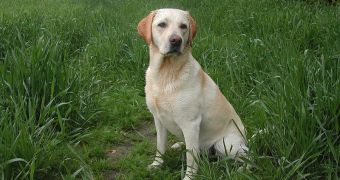Some time ago, researchers determined that children who are raised in households with a pet dog during early infancy are less likely to develop asthma and allergies. In a new study, scientists in the United States were able to determine the root causes of this protective effect.
The new investigation was carried out by researchers at the University of California in San Francisco (UCSF) and the University of Michigan (U-M). They analyzed the reactions of lab mice who were exposed to the type of dust that is produced in homes where dogs are allowed both indoors and outdoors.
What the team found was that the gastrointestinal microbiome in the test mice (the collection of bacteria and microbes in their guts) changed in response to this specific type of dust. This change was not observed in mice that were not exposed to the presence of dust produced by pet dogs.
The study was led by Susan Lynch, PhD, who is an associate professor with the Division of Gastroenterology at UCSF, and Nicholas Lukacs, PhD, who holds an appointment as a professor with the Department of Pathology at U-M, Science Blog reports.
At the same time, the mice exhibited a decrease in the type of immune system reactivity to regular allergens. This protective effect was largely due to a specific bacterial species in the gut, which seems to be able to protect the airways against viral respiratory infections and the actions of allergens.
The microorganism in question is called Lactobacillus johnsonii, the research team explains in this week's online issue of the esteemed journal Proceedings of the National Academy of Sciences (PNAS). The investigation was sponsored by the National Institute of Allergy and Infectious Diseases (NIAID).
“The results of our study indicate that this is likely to be one mechanism through which the environment influences immune responses in early life, and it is something we are currently examining using human samples in a large multi-institutional collaborative study funded by the NIAID,” says Lynch.
“Gut microbiome manipulation represents a promising new therapeutic strategy to protect individuals against both pulmonary infection and allergic airway disease,” the investigator concludes.

 14 DAY TRIAL //
14 DAY TRIAL //